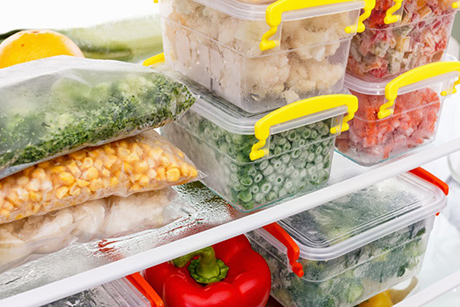
Using your freezer to preserve make-ahead meals, desserts, snacks and more, can save you money, reduce food waste and turn you into a kitchen saviour on busy weeknights. But you can’t get ahead of the game if you don’t know what can freeze and for how it can be frozen.
Foods high in water, like melons and squash, don’t freeze well, rendering them granular upon defrosting. While others like chicken breasts, cookie dough and chili were seemingly made for the deep freeze. From vegetables and fruit to fully prepared dinners, you’ll want to keep our food freezing guide handy next time you’re in the mood to stockpile.

Essential Freezing Tips:
– Label foods before freezing with the date and its contents.
– Make at least one meal per week to use up freezer foods.
– Prevent freezer burn by using freezer-friendly bags, not the oftentimes thin plastic the food comes in.
– If freezing soups, stews and other dishes that are high in liquids, remember that when frozen, food expands, so be sure to leave headspace on your container to avoid bursting.
– Keep freezer temperature at -18ºC (0ºF).
– Remove as much air as possible from containers and bags of food to avoid spoilage and freezer burn.
– Defrost your freezer according to manufacturer’s directions at least twice per year.
– When in doubt, throw it out!
Produce:
Vegetables: 6 to 12 months
Fruit: 6 to 12 months
Juices and juice concentrates: 6 to 12 months
Prepared smoothies: 1 month
Produce not to freeze: melons, citrus (juice can be frozen, no whole fruit or segments), apples, pears, lettuce, radishes, alfalfa sprouts, potatoes (unprepared, you can freeze mashed potatoes), eggplant, mashed pumpkin and squash

Bread and Grains:
Baked bread: 3 months
Unbaked bread: 1 month
Pizza (homemade): 1 to 2 months
Cooked rice: 3 months
Cooked whole grains: 3 months
Cooked pasta: 3 months
Bread and grains not to freeze: cooked quinoa, uncooked grains, uncooked pasta, cereal, cooked and raw oatmeal
Meat and Poultry:
Beef (steaks): 6 to 12 months
Pork: 4 to 6 months
Lamb: 6 to 12 months
Chicken and Turkey (whole): 12 months
Chicken and Turkey (parts): 6 months
Ground meat and poultry: 3 to 6 months
Sausages: 2 to 3 months
Cooked meat and poultry: 3 months
Meat and Poultry not to freeze: deli meats
Seafood:
Fatty fish (salmon, mackerel, sardines): 3 months
Lean fish (tilapia, halibut): 6 months
Cooked fish: 4 to 6 months
Shellfish: 3 months
Lobster: 12 months
Oysters: 2 to 3 months
Clams: 2 to 3 months
Mussels: 2 to 3 months
Seafood not to freeze: canned fish (in can, you can freeze canned fish outside of can in a separate container up to 3 months)

Dairy and Eggs:
Milk: 3 to 6 months
Butter (unsalted, salted): 8 to 12 months
Margarine: 12 months
Eggs (out of shell): 1 month
Hard cheese: 6 months
Dairy and Eggs not to freeze: whole eggs in shell, hard boiled or cooked eggs, cottage cheese, yogurt, soft cheese (goat cheese, cream cheese), sour cream, buttermilk, kefir
Beverages:
Juices and juice concentrates: 6 to 12 months
Milk: 3 to 6 months
Prepared smoothies: 1 month
Beverages not to freeze: carbonated drinks, soda, beer, wine, coffee (beans and brewed), tea (leaves and brewed), anything in glass bottles
Prepared Meals and Miscellaneous:
Broth: 3 months
Soups: 3 months
Stews: 3 months
Chili: 3 months
Casseroles (without eggs, meat or fish): 2 months
Casseroles (with eggs, meat or fish): 1 month
Frozen TV dinners: 3 to 4 months
Miscellaneous not to freeze: mayonnaise, prepared deli salads (egg salad, tuna salad, macaroni salad), salad dressings
Desserts and Baked Goods:
Cookies (baked): 6 to 8 months
Cookie dough (unbaked): 3 months
Cake (frosted): 1 month
Cake (unfrosted): 3 months
Cheesecake: 6 to 8 months
Pie (unbaked, fruit): 2 to 4 months
Pie (baked, fruit): 6 to 8 months
Pie (baked, pumpkin, sweet potato, pecan): 1 to 2 months
Muffins and quick breads: 6 to 12 months
Desserts and Baked Goods not to freeze: custards, cream pies, pudding, prepared milkshakes
Want to get the most out of your freezer? Watch this video on how to prep food for freezing.
